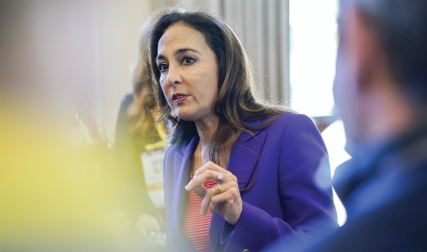The Ashes of Civilization
Somewhere in the boxes that have followed me through various moves during the past 40 years, I have a sketchbook from my Dartmouth days (1976-79). A significant portion is devoted to the left side of the Orozco mural [“The Mural of the Story,” November/December 2019], a sign of the amount of time I spent not studying the materials I was there to read. Why one side? Because back then that was the smoking section of the reserve room—little-known fact No. 11 to add to your list.
Bennett Samson ’80
West Hollywood, California
Experts’ Opinions
President Hanlon’s article, “Nothing But the Truth” [November/December 2019], was a timely warning against the insidious postmodern mindset that is beguiling the current generation. He lamented that today’s youth often eschew traditional experts in favor of the groupthink/echo-chamber cauldron of social media, even though such sources are largely bereft of facts. “We must not relent,” he wrote, “in our commitment to elevating the values that characterized the Age of Enlightenment and…a Dartmouth education: respect for open-minded inquiry, evidence, logic, and reason.” He even suggested that our very existence as a society was at stake. Strong words.
So how is Dartmouth faring in this struggle? Reviews are mixed.
For example, a blurb in the “Campus” section of the same issue, under the heading “Naming Rights,” announced that students will no longer be limited to their biological genders in identifying themselves on official College documents. Until very recently one’s gender was universally recognized as an immutable scientific fact. But in today’s culture facts are pliable, and “truth” is determined not by the evidence but by one’s depth of conviction and number of retweets.
President Hanlon’s dire warnings are not mere hyperbole or alarmism. If postmodern thinking supplants empiricism as our dominant worldview, then Western civilization’s days are truly numbered.
Paul Aubin ’83
Bakersfield, California
Unhappy Meal
Alumni featured in DAM’s last issue were remarkably out of touch. Trey Laird ’93 was praised for running a sober-living home for “executive addicts,” where he asserted that having “a home, family, and good job” made him unable to relate to “a 20-year-old heroin addict who’s never had a bank account,” despite their shared experience of addiction [“Safe Haven,” November/December 2019]. I hope Laird is willing to contribute something of the largesse from his two-decade career in finance not only to fellow executives, but also toward a universal healthcare system that treats all addiction sufferers.
McDonald’s chief marketing officer Morgan Flatley ’96 [“Burger Queen”] discussed how artificial intelligence helps her encourage “day laborers” and “people paying with change they scrounge from the cup holder” to part with their cash for a Big Mac. I am personally more excited about this year’s global McDonald’s strikes. Between Flatley’s $1-billion budget and the recently fired McDonald’s CEO’s $42-million exit package, I hope the brand can scrounge some change to pay its workers a fair wage. I encourage interested alumni to read Dartmouth professor Annelise Orleck’s book, “We Are All Fast Food Workers Now”: The Global Uprising Against Poverty Wages.
Jordan Osserman ’11
London



